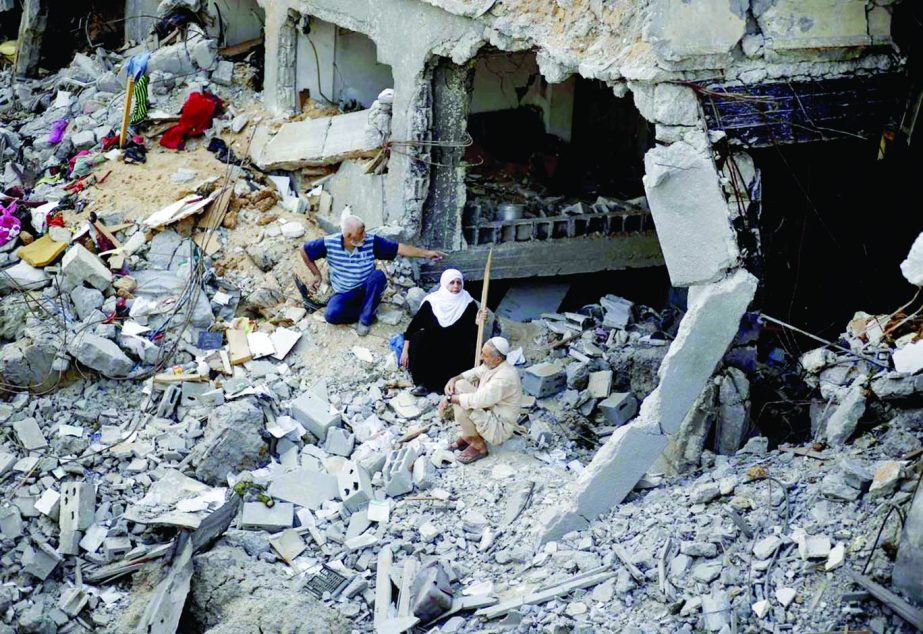
News Desk :
Israel pulled its ground forces out of the Gaza Strip on Tuesday and started a 72-hour ceasefire with Hamas mediated by Egypt as a first step towards negotiations on a more enduring end to the month-old war.
Officials from the United Nations and United States, who have been pushing for a cease-fire for weeks, hope that the three-day pause will allow negotiations to take place for a more lasting peace.
Gaza officials say the four-week conflict has killed 1,867 Palestinians. Some 67 Israelis have also been killed.
The UN estimates that 75% of the Gaza residents who died were civilians, more than 400 of them children.
The conflict has displaced more than 200,000 people across the densely populated territory. For the first time Tuesday, the number of people packed into UN shelters decreased, said UN official Chris Gunness in Gaza.
After the cease-fire began, residents trickled into Shujaya, an area near Gaza City that experienced some of the most destructive violence of the conflict. They found craters and ruins where homes and shops once stood.
People scaled crumbled concrete and twisted metal to rummage for any belongings left in the rubble.
Israeli armour and infantry withdrew from the Gaza Strip ahead of the truce, with a military spokesman saying their main goal of destroying cross-border infiltration tunnels had been completed. “Mission accomplished,” the military tweeted.
Troops and tanks will be “redeployed in defensive positions outside the Gaza Strip and we will maintain those defensive positions”, spokesman Lieutenant-Colonel Peter Lerner said, reflecting Israeli readiness to resume fighting if attacked.
Sami Abu Zuhri, a spokesman for the Islamist Hamas faction that rules Gaza, said Israel’s offensive in the densely populated, coastal enclave was a “100 percent failure”.
Israel sent officials to join talks in Cairo to cement a longer-term deal during the course of the truce.
“The delegates left under an hour ago. I assume they’ve already arrived in Egypt,” an Israeli official said.
In Gaza, where some half-million people have been displaced by a month of bloodshed, some residents, carrying mattresses and with children in tow, left UN shelters to trek back to neighbourhoods where whole blocks have been destroyed by Israeli shelling and the smell of decomposing bodies fills the air.
Sitting on a pile of debris on the edge of the northern town of Beit Lahiya, Zuhair Hjaila, a 33-year-old father of four, said he had lost his house and his supermarket.
“This is complete destruction,” he said. “I never thought I would come back to find an earthquake zone.”
Several previous truce attempts by Egypt and other regional powers, overseen by the United States and United Nations, failed to calm the worst Israeli-Palestinian fighting in two years.
Hamas said it had informed Egypt “of its acceptance of a 72-hour period of calm”, beginning on Tuesday.
The Palestinian cabinet issued a statement after its weekly meeting in Ramallah welcoming the ceasefire.
The US State Department also welcomed the truce and urged the parties to “respect it completely”. Spokeswoman Jen Psaki said Washington would continue its efforts to help the sides achieve a “durable, sustainable solution for the long term”.
Efforts to turn the ceasefire into a lasting truce could prove difficult, with the sides far apart on their central demands, and each rejecting the other’s legitimacy. Hamas rejects Israel’s existence, and vows to destroy it, while Israel denounces Hamas as a terrorist group and eschews any ties.
Besides the truce, Palestinians demand an end to the Israeli-Egyptian blockade on impoverished Gaza and the release of prisoners including those Israel arrested in a June crackdown in the occupied West Bank after three Jewish seminary students were kidnapped and killed. Israel has resisted those demands in the past. UN Secretary-General Ban Ki-moon “urges the parties to commence, as soon as possible, talks in Cairo on a durable ceasefire and the underlying issues,” his office said in a statement. Regev said Tuesday that Israel will send a delegation to Cairo if the current cease-fire holds.
A Palestinian delegation was in Cairo over the weekend, the Egyptian state media reported. The delegation included representatives of Fatah and Palestinian intelligence, Hamas and Islamic Jihad, the Egyptian report said.
In the latest example of the ripples the conflict has sent around the globe, a British government minister said she was resigning over her country’s policy on Gaza.
On Monday, French Foreign Minister Laurent Fabius slammed the “carnage in Gaza.”
The main Palestinian demands remain on the table, notably a full Israeli troop withdrawal from Gaza, the end of the blockade of the territory and the opening of border crossings.
Israeli Prime Minister Benjamin Netanyahu has said that Israel’s main goal is to “return quiet and security to the citizens of Israel”. UN Secretary General Ban Ki-moon has welcomed the ceasefire. He called on both sides to hold talks in Egypt and for them to begin as soon as possible.

